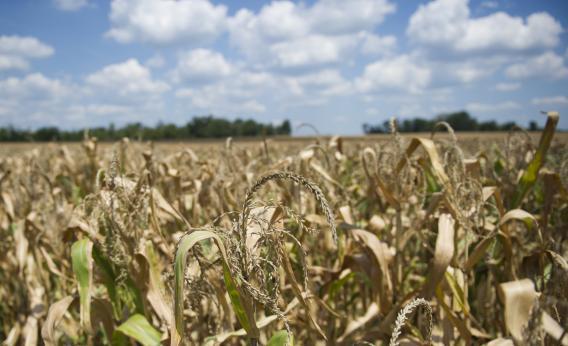Climate change is the gravest existential threat the planet faces. Whether we’re talking about flora or fauna, the damage that could, and is likely, to occur should give rise for alarm. To tackle such a complex problem will require major shifts in society. And one large sector that’s ripe for change is agriculture.
The current industrialized food systems—factory-style farming that consumes massive amounts of resources and relies heavily on chemicals—that are widespread in developed countries are a major contributor to climate change. But it doesn’t have to be that way. Key shifts in the way we produce food could take agriculture from a climate bust and turn it into a climate boon. This undertaking is the cause that gave rise to a Future Tense event at the New America Foundation on Thursday, July 25, called “An Agricultural Revolution to Fight Climate Change?” The event brought together a number of experts for panel discussions about how to spur on an agricultural transition—from an industrial process to an ecological, innovative method.
For instance, Mark Hertsgaard, the Schmidt Family Foundation fellow at New America and the author of HOT: Living Through the Next 50 Years on Earth, explained how consumers don’t need to give up their hamburgers and steaks to be environmentally conscious. An ecological model of cattle ranching, in which cows are grazed on grasslands instead of corn, can actually be beneficial for the climate. A recent Slate interview between Hertsgaard and food writer Michael Pollan explains how that could be the case: “The upshot, both for global climate policy and individual dietary choices, is that meat eating carries a big carbon footprint only when the meat comes from industrial agriculture,” Hertsgaard writes. “If you’re eating grassland meat,” Pollan says, “your carbon footprint is light and possibly even negative.”
During the event Hertsgaard also described how biochar—the name for charcoal when it’s used for specific purposes, like as an additive for soil—could be a natural way to sequester carbon from the atmosphere. Thus, helping slow the ongoing march of climate change.
While these changes would help, Kate Sheppard, a reporter for Mother Jones, asked the crucial question: Considering we don’t have a lot of time, can changes that need to happen occur fast enough and to a large enough scale? Peter Byck, the filmmaker behind the documentary Carbon Nation, said that a way to achieve scale is to incentivize a large corporation—say, McDonald’s or Wal-Mart—to tell its supply chain that it wants only ecologically raised, grass-fed beef. One way to do that is to internalize the cost of carbon emissions. Byck explained that a carbon tax could strike businesses where it really matters: the wallet. And not only that, but people from a wide-range of ideological backgrounds support an effective carbon tax, such a policy could quickly kick start change in agriculture. The trick is creating one that works.
There are more than just economic ways to encourage adoption of a new agricultural system. Judith D. Schwartz, author of the recent book Cows Save the Planet, said that all the terrible news we hear about climate has so demoralized people, they feel helpless to stop it. Yet, even a little ray of hope—such as that ecological agriculture would make a substantial impact—could be the spark needed to get people to join the food movement in one way or another. Such a shift in public perception would generate the demand necessary for corporations to change their product.
In addition to the panel, there was a discussion between Barry C. Lynn, who directs the New America Foundation’s Markets, Enterprise, and Resiliency Project, and Slate’s business and economics correspondent Matthew Yglesias. Throughout human agricultural history, food systems were wide open—people traded methods, products, and resources. However, according to Lynn in an article he co-authored for Slate with his New America colleague Lina Khan, “In recent years a few private companies have captured almost complete control over many vital technological realms, and the managers of many of these firms increasingly have an incentive to manipulate technological advancement in a way that serves their private interests only.” Lynn and Yglesias described how anti-trust laws could break up “Big Ag” monopolies and revitalize the competitive and innovative spirit needed to induce an agricultural revolution.
Changing how food is produced will be tough, but it’s a problem worth chewing on.
More from Future Tense’s special series on climate change and agriculture:
“Sun Food vs. Oil Food: Michael Pollan on how changing agriculture could reverse climate change,” by Mark Hertsgaard. July 2, 2013
“Let’s Make Genetically Modified Food Open-Source: It will help fight climate change and stick one in Monsanto’s eye,” by Frederick Kaufman. July 9, 2013
“Why Don’t Farmers Believe in Climate Change? And does it really matter whether they do?” by David Biello. July 16, 2013
“Reach for the Sun: Photosynthesis, in the form of biochar, may be one of the best defenses against climate change,” by Mark Hertsgaard. July 13, 2013
“Seed Money: Will Big Ag embrace technology to fight climate change?” by Barry C. Lynn and Lina Khan. July 23, 2013
